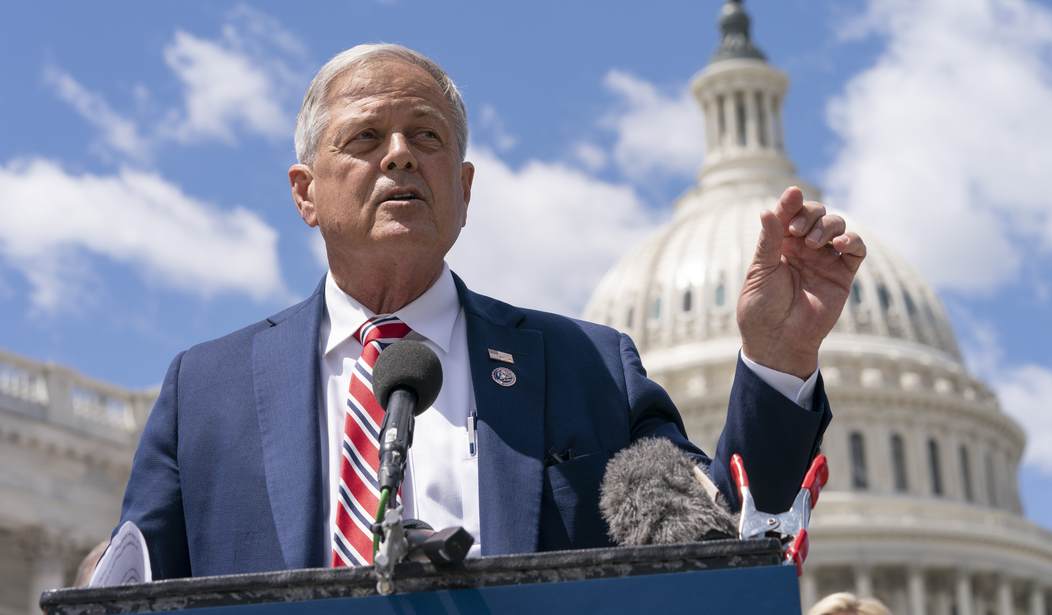The powerful conservative contingent of lawmakers known as the House Freedom Caucus formally weighed in on the simmering debt ceiling fight with a plan to "shrink Washington" and "grow America" on Friday morning. The group's plan states its members "will consider voting to raise the debt ceiling contingent upon the enactment of legislation" that includes sweeping cuts to bloated spending.
Moments ago the @freedomcaucus outlined common-sense cuts for raising the debt ceiling. We're clawing back:
— Rep. Ralph Norman (@RepRalphNorman) March 10, 2023
🔴 Biden’s $80B IRS expansion 🔴his $400B student loan debt transfer 🔴 unobligated, unspent Covid funds 🔴 billions in waste from the so-called Inflation Reduction Act. pic.twitter.com/1KbLCiInJ3
The conditions outlined by the Freedom Caucus fall into three categories: cutting current spending, capping future spending, and growing the economy.
The cuts to current spending listed by the Freedom Caucus include "ending President Biden's $400 billion student loan bailout; rescinding all unobligated, unspent COVID-19 funds; recouping the $80 billion in IRS expansion funds, as well as billions of wasteful climate change spending in the so-called "Inflation Reduction Act," and finding every dollar spent by Democrats that can be reclaimed for the American taxpayer."
Looking forward, the Freedom Caucus calls for "setting topline discretionary spending at the FY2022 level for 10 years, allowing for 1% annual growth." The group says doing so will reduce FY2024 spending by $131 billion and reduce long-term spending by $3 trillion. The Freedom Caucus notes in its plan that capping spending at the FY2022 level "puts our budget on the path to balance while protecting Social Security retirement and Medicare benefits."
To get America's economy moving back in the right direction, the Freedom Caucus calls for "enacting major policy changes and reforms" that include "curtailing burdensome regulations by requiring congressional approval under the REINS Act; unleashing the production of reliable domestic energy by ending federal regulations and subsidies; restoring Clinton-era work requirements on welfare programs; and passing a pre-emptive Continuing Resolution with non-defense discretionary spending restored to the pre-COVID FY 2019 level to force Congress to pass appropriations in a timely manner."
Recommended
Shrink Washington. Grow America. pic.twitter.com/vhteHNpNFS
— House Freedom Caucus (@freedomcaucus) March 10, 2023
Conservative members of the United States Senate — where Democrats have majority control — quickly chimed in with approval for the plan from the House Freedom Caucus. "Freedom Caucus is right," Sen. Mike Lee (R-UT) tweeted along with the group's plan. "This is how compromise can be achieved on the debt-ceiling discussion," he noted. Sen. Rick Scott (R-FL) said the plan had his full support and would mean "a return to commonsense in Washington...We need real change in DC and it must be secured as part of our debt-ceiling negotiations," he added. "I urge Republicans in the House to rally around this plan and pass it ASAP," Sen. Ron Johnson (R-WI) encouraged.
President Biden and others in the White House have repeatedly said that Biden would not entertain anything but a clean bill to raise the debt ceiling, but things are still at a stand-off as the deadline to avoid default draws nearer.
Ultimately, it looks like things will come down to who blinks first. Will House Republicans cave to Biden's demand and concede a key promise made to conservatives, or will Biden and his party agree to have limits placed on their tax-and-spending spree in order to increase the debt limit? It seems the White House will need to play ball and offer some conditions of its own since the current position of "no negotiations" is a non-starter, but it's unclear what policies Biden might seek to have included in any deal that's proposed.
Both sides have some room to negotiate — if Biden ever agrees to start talks — as the latest estimates from the Treasury say the "extraordinary measures" that have already been employed can avert a default until this summer.
























Join the conversation as a VIP Member